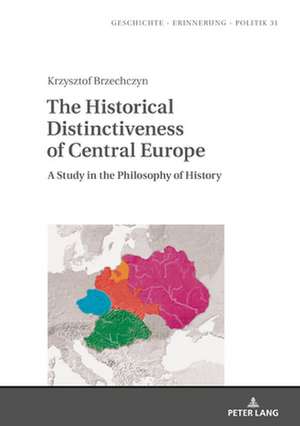Historical Distinctiveness of Central Europe: Geschichte - Erinnerung - Politik. Studies in History, Memory and Politics
Autor Krzysztof Brzechczyn Traducere de Klara Naszkowskaen Limba Engleză Hardback – 28 mai 2020
Preț: 450.54 lei
Preț vechi: 585.12 lei
-23% Nou
Puncte Express: 676
Preț estimativ în valută:
86.23€ • 89.78$ • 72.87£
86.23€ • 89.78$ • 72.87£
Carte tipărită la comandă
Livrare economică 10-24 martie
Preluare comenzi: 021 569.72.76
Specificații
ISBN-13: 9783631809907
ISBN-10: 3631809905
Pagini: 394
Dimensiuni: 148 x 210 mm
Greutate: 0.67 kg
Editura: Peter Lang Copyright AG
Seria Geschichte - Erinnerung - Politik. Studies in History, Memory and Politics
ISBN-10: 3631809905
Pagini: 394
Dimensiuni: 148 x 210 mm
Greutate: 0.67 kg
Editura: Peter Lang Copyright AG
Seria Geschichte - Erinnerung - Politik. Studies in History, Memory and Politics
Notă biografică
Krzysztof Brzechczyn is a professor at the Faculty of Philosophy in Adam Mickiewicz University in Poznän. He has authored several books and papers in different languages. His fields of interest include modern history, intellectual history, philosophy of history, social philosophy, and theory of historiography.
Cuprins
Economic dualism - manorial-serf economy - modern history - economic backwardness - Central Europe - modeling in history - idealization - non-Marxian historical materialism - theory of history - cascade process
Descriere
The aim of this book is to explain economic dualism in the history of modern Europe. The emergence of the manorial-serf economy in the Bohemia, Poland, and Hungary in the 16th and the 17th centuries was the result of a cumulative impact of such factors as the weakness of cities, political dominance.














